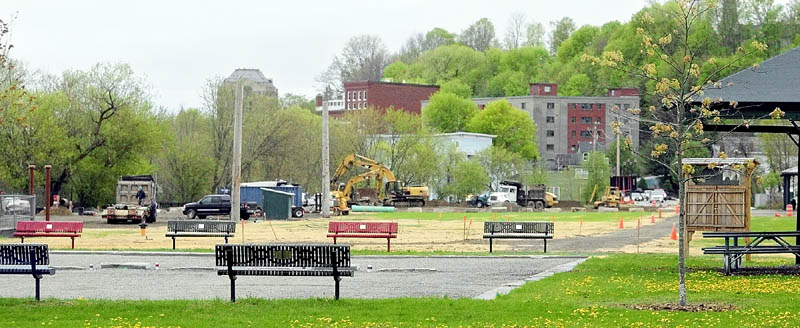AUGUSTA — Following a nearly two-year sewer project that tore up much of Mill Park, grass is beginning to poke up once again, as construction workers finish up the project and prepare to return the expansive park to the public.
A plan to create a concert venue and other amenities at the park alongside the Kennebec River could spring to life soon, too, as the city looks to take advantage of the park’s fresh start.
“I’ve been watching it, over the last 30 days, go from a construction site to into what will hopefully be a cornerstone park for people to come to and enjoy the riverfront,” City Councilor Jeffrey Bilodeau said. “It looks beautiful down there, and I’ve seen the grass punching up through the last two or three days. I can see this being more of a multi-purpose venue. We also want to try to make the park self-sustaining.”
Bilodeau suggested that Augusta might want to consider a waterfront concert venue similar to the one in Bangor.
“Maybe we can create venues, such as a concert venue, which could bring profits to the park, which in turn could help bring other amenities,” he said.
S.E. MacMillan is the general contractor of a $15.2 million Greater Augusta Utilities District project that involves installing a new system of pipes and storage tanks to prevent sewage overflows into Bond Brook during heavy rainstorms. The company is finishing up work and could be done as soon as a week or so, according to Brian Tarbuck, general manager of the utilities district. The project included the installation of two 700-foot-long, 10-foot-wide, 10-foot-high concrete tanks underground at Mill Park.
Councilor Patrick Paradis will serve as chairman of an ad hoc committee which will study how to best redevelop the park, now that the sewer project is winding down.
But most major changes in use or big events will have to wait, to allow time to let the grass grow in, and to finalize plans for a parking lot there. Though the dog park, petanque courts, and a farmers market at the site will continue to be available, as they have been even during construction at the park.
“No events will be held on the grounds of Mill Park while that grass begins to grow,” Paradis said. “The dog park is still available. The petanque courts will be playing and so forth. But there won’t be any concerts there, no Smokey’s Carnival there, because it’s just too tender. We need to give it a seasons time to grow and take root.”
By then, the site may have a new, paved and striped parking lot.
In 2000, Augusta voters approved spending $2.5 million for a “parking solution” for the downtown area. Most of the money went into a parking garage built just above Water Street.
However, City Services Director Leif Dahlin said $272,000 of that sum was set aside to build a parking lot at Mill Park. The money hasn’t been spent because officials knew the sewer project was coming up and didn’t want to build a new parking lot only to have to tear up the pavement for the sewer work.
Dahlin said the city has received $105,000 in fees from MacMillan for using the Mill Park site during the project, and $10,000 from Central Maine Power Co. as that company also used city land as a staging area for a nearby project, so the city has an additional $115,000 available to spend on park improvements.
Dahlin suggested that a concrete slab, replacing a deteriorated one removed from the park as part of the sewer project, could serve as both a skating rink surface and part of a concert amphitheater.
He said granite slabs on the site will be placed around the park to help prevent motorists from driving onto the grounds and damaging the grass.
Dahlin said it appears MacMillan will leave the park in a bit better condition than it was in when the project started. The firm’s contract required it to leave the park in at least the same condition it was in when it began.
Tarbuck said the sewer and drainage project removed four combined sewer overflow sites that used to discharge sewage into Bond Brook during major rainstorms. The sewage now will be captured and diverted instead into the massive concrete storage tanks under the park, which together can hold more than 1 million gallons.
He said the project is wrapping up on time and, so far, under budget. It was projected to cost about $15.2 million but so far has only cost about $12.4 million. He warned that figure could change, however, when the final costs are tallied.
He said a rate increase for the project is already in effect, with no additional rate increases expected until at least 2016. He hopes the district may be able to make it until 2018 with no major rate changes. In 2018, he said, the district will have paid off a significant amount of debt, freeing money for regular district operations and projects.
“If we can make it to 2018, we won’t need a rate increase at all,” Tarbuck said. “Our hope is the amount of money we’re paying in debt service now, with our current rates, we hope we can roll that back into (operations and maintenance and capital improvement plan) projects and not need a rate increase. It’s hard to predict the future, so we’re not making any guarantees; but our rates were designed for five years, So we’re hoping to provide rate stability for at least that long.”
Keith Edwards — 621-5647
kedwards@centralmaine.com
Send questions/comments to the editors.




